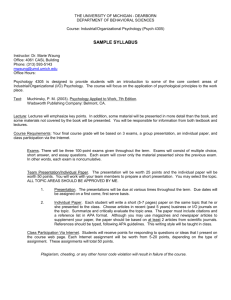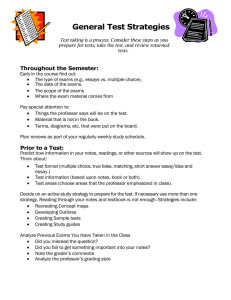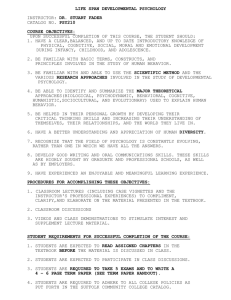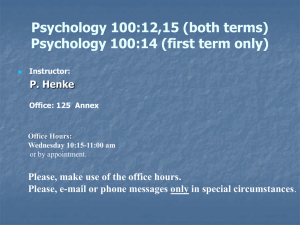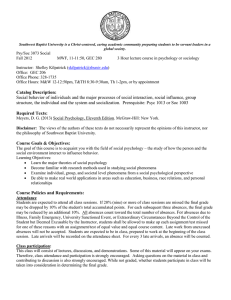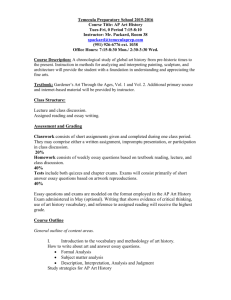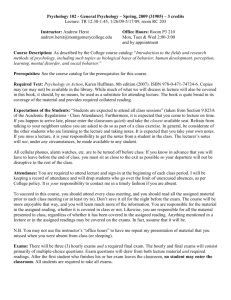PSYCHOLOGY 40 - fog.ccsf.edu
advertisement
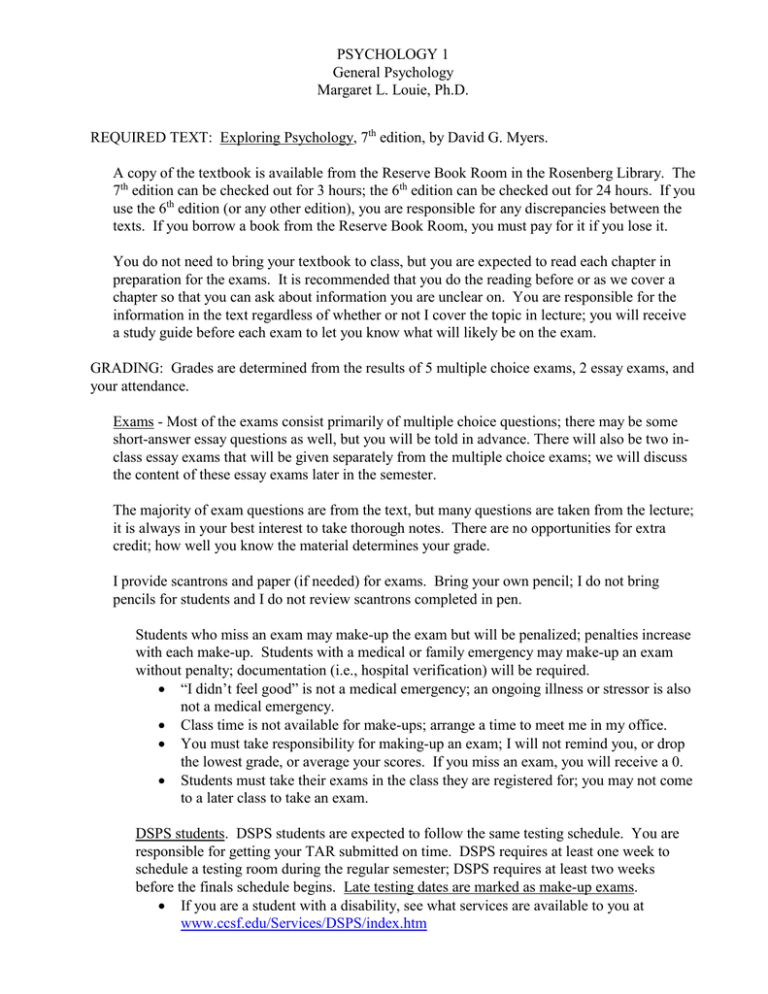
PSYCHOLOGY 1 General Psychology Margaret L. Louie, Ph.D. REQUIRED TEXT: Exploring Psychology, 7th edition, by David G. Myers. A copy of the textbook is available from the Reserve Book Room in the Rosenberg Library. The 7th edition can be checked out for 3 hours; the 6th edition can be checked out for 24 hours. If you use the 6th edition (or any other edition), you are responsible for any discrepancies between the texts. If you borrow a book from the Reserve Book Room, you must pay for it if you lose it. You do not need to bring your textbook to class, but you are expected to read each chapter in preparation for the exams. It is recommended that you do the reading before or as we cover a chapter so that you can ask about information you are unclear on. You are responsible for the information in the text regardless of whether or not I cover the topic in lecture; you will receive a study guide before each exam to let you know what will likely be on the exam. GRADING: Grades are determined from the results of 5 multiple choice exams, 2 essay exams, and your attendance. Exams - Most of the exams consist primarily of multiple choice questions; there may be some short-answer essay questions as well, but you will be told in advance. There will also be two inclass essay exams that will be given separately from the multiple choice exams; we will discuss the content of these essay exams later in the semester. The majority of exam questions are from the text, but many questions are taken from the lecture; it is always in your best interest to take thorough notes. There are no opportunities for extra credit; how well you know the material determines your grade. I provide scantrons and paper (if needed) for exams. Bring your own pencil; I do not bring pencils for students and I do not review scantrons completed in pen. Students who miss an exam may make-up the exam but will be penalized; penalties increase with each make-up. Students with a medical or family emergency may make-up an exam without penalty; documentation (i.e., hospital verification) will be required. “I didn’t feel good” is not a medical emergency; an ongoing illness or stressor is also not a medical emergency. Class time is not available for make-ups; arrange a time to meet me in my office. You must take responsibility for making-up an exam; I will not remind you, or drop the lowest grade, or average your scores. If you miss an exam, you will receive a 0. Students must take their exams in the class they are registered for; you may not come to a later class to take an exam. DSPS students. DSPS students are expected to follow the same testing schedule. You are responsible for getting your TAR submitted on time. DSPS requires at least one week to schedule a testing room during the regular semester; DSPS requires at least two weeks before the finals schedule begins. Late testing dates are marked as make-up exams. If you are a student with a disability, see what services are available to you at www.ccsf.edu/Services/DSPS/index.htm Psychology 1, MWF, page 2 Margaret L. Louie, Instructor Attendance – City College policy allows six (6) absences for emergencies and illness, but otherwise requires students to attend every class. Illness, appointments, late adds, etc. are considered to be absences. Excused absences are allowed for family death, hospitalization, or jury duty; documentation is required and I only allow a week of excused absence. It is in your best interest to attend class regularly. I do not give out my lecture notes nor do I give personal lectures. You are responsible for finding out about any information given out on any day you are absent; do not ask me to review what you missed – ask one of your colleagues. If you miss more than six classes for any reason, I am allowed to drop you from the class. I may or may not drop you after six absences; it depends on the circumstances. Ultimately, it is your responsibility to drop the class if you feel you cannot complete the course, or to let me know that you wish to stay in the class. However, if you are absent more than one-fourth of the semester (12 absences) REGARDLESS of the reasons, REGARDLESS of your exam performance, I will definitely drop you from the class, or if it is too late to drop you, I will give you a failing grade. On Day 1 of the semester, everyone has a perfect attendance grade. Your attendance grade will be lowered by each absence until you reach 13 absences, at which point you will fail the class or be dropped (see above). More than 6 absences will dramatically hurt your attendance grade. Your attendance grade will also be affected if you consistently leave class early or come to class late. You are responsible for making sure that I mark your presence if you come in late. You will be marked absent if you miss half the class (25 minutes). You will be given half-credit if you are 15 minutes late. For every five (5) tardies that are less than 10 minutes, you will be given an absence. You may clear up to 6 absences, however, by volunteering an equal amount of hours at a nonprofit agency. We will discuss this option later. Grade values – Grade values for the class are as follows: Exams (5) Essay Exams (2) Attendance Maximum Points (subject to change) 235 points 30 points 50 points 315 points Grades are determined according to the following guidelines: A = 90% B = 80% C = 70% D = 50% If you choose the P/NP option, you must receive a grade of C in order to pass this course. You must petition for this option through the Registrar's office. Cheating – Any student found cheating on an exam or plagiarizing a paper will be given a grade of zero for that assignment. Academic dishonesty may be reported to the Dean of Students Psychology 1, MWF, page 3 Margaret L. Louie, Instructor GENERAL CLASS EXPECTATIONS This class is UC and CSU transferable; you can expect the class to be challenging. It is highly recommended (but not required) that you qualify for ENGL 92, ESL 82, or ESL 160 before taking this class. College level writing is expected for all written assignments; writing should be thorough and organized, and is graded accordingly. Case examples that are described in class have been modified; if you think you recognize the case being described, you are wrong because that person doesn’t exist as described. Some of the topics in this class may trigger psychological issues for you; the classroom is not the place to discuss them. See me privately if you’d like a referral to counseling. City College has a Student Code of Conduct that delineates appropriate student behavior. Consult this document to know what is expected from you as a student at City College. If you do not follow these expectations, I may refer you to the Dean of Students for disciplinary action. You can access this list at: www.ccsf.edu/Offices/Student_Advocacy_Rights_and_Responsiblities/rules. Disruptive behavior in the classroom is not tolerated. Here are some of the issues you should be aware of: Racist, sexist, homophobic, or other disrespectful slurs are not acceptable in the classroom. Be respectful of other people's perspectives and interests. There are no “stupid questions” in my classes; if we are off topic, I am responsible for ending a discussion. Do not have separate discussions with your neighbors/friends. It is very distracting to all of us. If you are distracted by a classmate’s chattering, please inform me and I will take care of it. It is generally not useful for you to confront the student directly. Remember to turn off your phones, Blackberries, etc. during class. If you use your Blackberry to take notes, please let me know; otherwise, I will assume you are texting and will ask you to stop. You are expected to stay in the classroom during the entire class; do not come in and out of the classroom once class starts. You will be marked tardy or absent. Cheating will result in an immediate grade of zero, and a referral to the Dean of Students. To limit the temptation to cheat, the following behaviors are expected during an exam: You are expected to stay in the classroom until you have completed your exam. If you need to go to the bathroom or need tissue, take care of it BEFORE you start the exam. Dictionaries, music, and/or any electronic devices are not allowed during an exam; you must remove your hood while taking an exam. Cell phones should be turned off. Do not answer your phone during an exam; do not refer to it to check the time. Desks are cleared of all items. INSTRUCTOR AVAILABILITY (available on the CCSF website [see Employee Directory]) Office: Batmale 340 Office hours: Wednesdays and Fridays, 11:10am-Noon, and by appointment Phone: (415) 239-3567 Psychology 1, MWF, page 4 Margaret L. Louie, Instructor Email: mlouie@ccsf.edu Email and voicemail messages are not always reliable; I do not check messages daily though I usually respond within 3 days. I do not check email on weekends or holidays. Check with me if I have not responded to your email – sometimes it goes directly to quarantine. Do not email me yesterday expecting a reply for an assignment that is due tomorrow; your procrastination does not constitute an emergency that I must respond to. If you have questions regarding an assignment, make sure you ask about it early. Suspicious email is routinely deleted due to the possibility of viruses; be sure to show your name and/or write “Psych 1” on your subject line to avoid being deleted. I do not accept any completed assignments via email (or fax). Please do not invite me to join your Facebook, mySpace, LinkedIn, etc. As much as I would like to get to know my students, I don’t have time to be on the Net; don’t be offended when I decline your invitation. If I need to contact students, I will use the email address that has been assigned to you by CCSF; you should check your CCSF email on occasion, or you may want to have messages forwarded to your regular email account. Website: http://fog.ccsf.edu/mlouie Most handouts will be available on my CCSF website after they are passed out to the class. If you are absent, it’s a good idea to check my website for announcements. COURSE OBJECTIVES Identify psychology as a science and the profession that applies the accumulated knowledge of this science to practical problems. Compare and contrast the major contemporary theoretical perspectives in psychology. Describe, contrast and evaluate the basic research methods of psychology. Evaluate psychological research and theory as presented both in the popular media and in professional journals. Summarize, discuss and evaluate current and past research and theory in the following major content areas: physiological correlates of behavior, sensation and perception, learning, memory, cognition consciousness, motivation, emotion, psychological disorders and treatments for psychological disorders. Apply the theories and research findings discussed in class to increase understanding of self and others. Welcome to the class! I hope you find it interesting and challenging. Psychology 1, MWF, page 5 Margaret L. Louie, Instructor Course Schedule Spring 2011 Jan 19 21 class expectations read chapter 1 – Thinking Critically with Psychological Science Jan 24 26 28 continue chapter 1 continue chapter 1 read chapter 2 – Neuroscience and Behavior Jan 31 Feb 2 3* 4 5 continue chapter 2 continue chapter 2 HOLIDAY – LUNAR NEW YEAR FACULTY FLEX DAY – NO CLASSES LAST DAY TO ADD Feb Exam #1 – chapters 1 & 2 read chapter 3 – Nature, Nurture, and Human Diversity LAST DAY TO DROP continue chapter 3 7 9 10* 11 Feb 14 16 18 read chapter 9 – Thinking, Language, and Intelligence read chapter 4 – Development through the Life Span HOLIDAY – PRESIDENTS DAY Feb 21 22* 23 25 HOLIDAY – PRESIDENTS DAY LAST DAY TO REQUEST P/NP OPTION continue chapter 4 continue chapter 4 Feb 28 Mar 2 4 Exam #2 – chapters 3, 9, & 4 Essay Exam #1 read chapter 5 – Sensation and Perception Mar continue chapter 5 read chapter 6 – States of Consciousness continue chapter 6 7 9 11 Mar 14 16 18 read chapter 7 - Learning continue chapter 7 continue chapter 7 Mar 21 23 25 Exam #3 – chapters 5, 6, & 7 review Critical Thinking Exam HOLIDAY – CESAR CHAVEZ DAY Mar 28 - Apr 3 SPRING VACATION Psychology 1, MWF, page 6 Margaret L. Louie, Instructor Apr 4 6 8 read chapter 8 - Memory continue chapter 8 continue chapter 8 Apr 11 13 15 read chapter 10 - Motivation continue chapter 10 read chapter 11 – Emotions, Stress, & Health Apr 18 20 21* 22 continue chapter 11 continue chapter 11 LAST DAY TO WITHDRAW Exam #4 – chapters 8, 10, & 11 Apr 25 27 29 Critical Thinking Essay Exam #2 read chapter 12 – Theories of Personality continue chapter 12 May 2 4 6 continue chapter 12 read chapter 13 – Psychological Disorders continue chapter 13 May 9 11 13 May 16 18 continue chapter 13 read chapter 14 - Therapy continue chapter 14 continue chapter 14 continue chapter 14 read chapter 15 – Social Psychology Finals Schedule begins Friday, 5/20/11. You will no longer be meeting for classes – you only go to your scheduled finals. Finals will take place in your regular classroom, but at a different time. Find your corresponding class meeting time (or section) for the date and time of your final exam. You are welcome to take your final on one of the other dates, but only if there is space, and you must speak with me first. Anyone who shows up for an exam in which s/he is not registered without prior permission from the instructor will be marked as taking a make-up exam. Exam #5 – chapters 12, 13, 14, & 15 9:00 MWF in B715 (sec 003) on Monday, May 23, 9:00am-10:30am 10:00 MWF in B715 (sec 001) on Friday, May 27, 10:30am-12:00pm 12:00 MWF in B705 (sec 010) on Monday, May 23, 1l:00am-12:30pm
